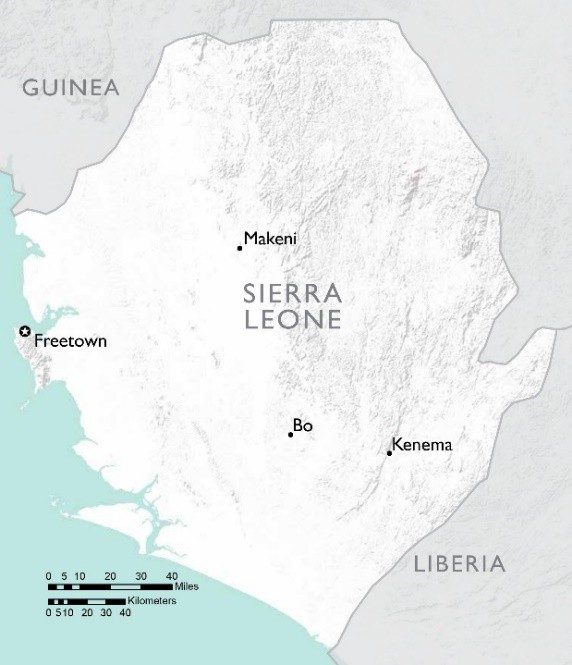Home » What We Do » Agriculture and Food Security » Food Assistance » Country Fact Sheets » Food Assistance Fact Sheet - Sierra Leone
- What We Do
- Agriculture and Food Security
- Democracy, Human Rights and Governance
- Economic Growth and Trade
- Education
- Ending Extreme Poverty
- Environment and Global Climate Change
- Gender Equality and Women's Empowerment
- Global Health
- Water and Sanitation
- Working in Crises and Conflict
- U.S. Global Development Lab

September 14, 2017
Situation
- The Ebola epidemic in Sierra Leone had severe impacts on the country’s health system, economy and food security situation. Many households experienced new or increased food insecurity as Ebola-related fears and restrictions on movement and mass gatherings disrupted trade, increased food prices and reduced household income.
- Food security in Sierra Leone is undermined by chronic poverty. The UN World Food Program reports that over half of the population lives under the national poverty line of approximately $2 per day. According to the 2016 Global Hunger Index, Sierra Leone also faces an alarming level of hunger, with nearly 38 percent of children younger than five years of age suffering from chronic malnutrition.
- According to the USAID-funded Famine Early Warning Systems Network (FEWS NET), the weak national currency has driven cereal prices up and reduced purchasing power for some poor households, undermining their access to food. Overall, however, the food security situation in Sierra Leone is improving as the main season crops have performed well due to sufficient rainfall. The harvest, combined with normal market and labor activities, will allow poor households to meet their food needs in the coming months and face Minimal (IPC Phase 1)* food insecurity until January 2018.
*The Integrated Phase Classification (IPC) is a standardized tool that aims to classify the severity and magnitude of food insecurity. The IPC scale, which is comparable across countries, ranges from Minimal (IPC 1) to Famine (IPC 5).
Response
- The Office of Food for Peace (FFP) has partnered with non-governmental organizations ACDI/VOCA, CARE, Catholic Relief Services, Save the Children and World Vision to provide much needed food assistance to households impacted by the Ebola epidemic. This support, provided through a mix of targeted cash transfers, agricultural input vouchers and other complementary activities, continues to boost food access and household purchasing power while simultaneously promoting market recovery.
- In response to Freetown’s August 2017 flooding and mudslide disaster, which killed over 500 people and displaced more than 1000 households, FFP coordinated with CARE to address immediate emergency needs. With FFP support, CARE rapidly distributed food and relief items, including hygiene kits and kitchen equipment, to flood-affected families.
- During the Ebola response, FFP enabled FEWS NET to increase food security monitoring and reporting in Liberia and Sierra Leone, which guided decision-makers to better respond to Ebola-related food insecurity. To document best practices and lessons learned from the Ebola response, FFP supports learning initiatives through the Cash Learning Partnership (CaLP) in Liberia and Sierra Leone.
Food for Peace Contributions
Total Contributions:
| U.S. Dollars | Metric Tons | |
|---|---|---|
| Fiscal Year 2017 | $14.3 million | --- |
| Fiscal Year 2016 | $3.5 million | --- |
| Fiscal Year 2015 | $40.4 million | 10,049 MT |
Food Security Situation information is provided by FEWS NET and WFP







Comment
Make a general inquiry or suggest an improvement.